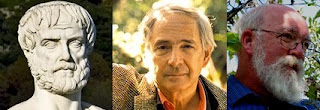Tuesday, May 23, 2023
Hell and conditional prophecy
In a recent
talk at the Angelicum (which can be viewed at YouTube),
Fr. Simon Gaine addresses the question of whether scripture teaches that some
will in fact be damned. He notes that
certain prophecies of Christ might seem to imply this, but suggests that they
may plausibly be read as conditional prophecies rather than descriptions of
what will in fact happen. Let’s take a
look at his argument.
Wednesday, May 17, 2023
Capital punishment and the law of nations
What is the
nature of Pope Francis’s 2018 change to the Catechism’s teaching on capital
punishment? Does it amount to a reversal
of traditional teaching? A development
of doctrine that is consistent with that teaching? A prudential judgment? And if the latter, is assent to the new
formulation binding on the faithful?
Barrett Turner offers an important analysis in his Nova et Vetera article “Pope Francis and the Death
Penalty: A Conditional Advance of Justice in the Law of Nations.” Let’s take a look.
Monday, May 8, 2023
Substance, teleology, and intentionality
There is an
illuminating parallel between the traditional Aristotelian distinction between substances, artifacts, and aggregates,
and the distinction John Searle draws between intrinsic intentionality, derived
intentionality, and as-if
intentionality. This might seem odd
given that the Aristotelian distinction is concerned with very general questions
about the metaphysics of physical objects, whereas Searle is concerned with a
very specific topic in the philosophy of mind.
But on closer inspection the parallel is quite natural and obvious, and
the connecting link is the notion of teleology.
Let’s first consider each distinction, and then we’ll be in a position
to see the parallels.
Tuesday, May 2, 2023
A Festschrift for Gyula Klima
My essay “Truth
as a Transcendental” appears in the Festschrift Metaphysics
Through Semantics: The Philosophical Recovery of the Medieval Mind: Essays in
Honor of Gyula Klima, edited by Joshua P. Hochschild, Turner C. Nevitt,
Adam Wood, and Gábor Borbély. Gyula’s
work has contributed mightily to the revival of interest in medieval and Scholastic
philosophy, and this honor is most deserved and welcome! You can check out the table of contents at Josh
Hochschild’s Twitter feed or at the
publisher’s website.
Subscribe to:
Posts (Atom)




